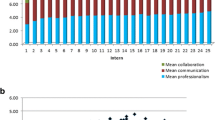Abstract
Leniency bias, or the tendency to evaluate individuals more favorably than is warranted, can prevent accurate evaluation and constructive supervision. This study tested leniency bias among field instructors of 90 clinical social work interns by comparing face-to-face and anonymous field instructors’ ratings of students’ knowledge, values, and skills. We also compared students’ own ratings to field instructors’ assessments. Results indicated little variance and consistently high ratings when field instructors evaluated face-to-face. There was greater variance and lower mean ratings when supervisors evaluated anonymously. Students’ self-assessments were the most critical and best matched the anonymous evaluations; whereas, the anonymous and face-to-face field instructor evaluations significantly differed on most items. These findings suggest the need for evaluation training for field instructors and the use of multiple assessment methods.
Similar content being viewed by others
References
Bogo, M., Regehr, C., Power, R., & Regehr, G. (2007). When values collide: Field instructors’ experiences of providing feedback and evaluating competence. The Clinical Supervisor, 26, 99–117.
Cohen, J. (1988). Statistical power analysis for the behavioral sciences (2nd ed.). Hillsdale, NJ: Lawrence Erlbaum.
Council on Social Work Education. (2002). Educational policy and accreditation standards. Alexandria, VA: Author.
Council on Social Work Education. (2008). Educational policy and accreditation standards. Alexandria, VA: Author.
Crowne, D. P., & Marlowe, D. (1960). A new scale of social desirability independent of psychopathology. Journal of Consulting Psychology, 24, 349–354.
Dettlaff, A. J., & Dietz, T. J. (2004). Making training relevant: Identifying field instructors’ perceived training needs. The Clinical Supervisor, 23, 15–32.
Fisher, C. D. (1979). The transmission of positive and negative feedback to subordinates: A laboratory investigation. Journal of Applied Psychology, 64, 533–540.
Gourdine, R. M., & Baffour, T. D. (2004). Maximizing learning: Evaluating a competency-based training program for field instructors. The Clinical Supervisor, 23, 33–53.
Green, R. G., Bretzin, A., Leininger, C., & Stauffer, R. (2001). Research learning attributes of graduate students in social work, psychology, and business. Journal of Social Work Education, 37, 333–341.
Holbrook, A. L., Green, M. C., & Krosnick, J. A. (2003). Telephone versus face-to-face interviewing of national probability samples with long questionnaires: Comparisons of respondent satisficing and social desirability response bias. Public Opinion Quarterly, 67, 79–125.
Holden, G., Anastas, J., & Meenaghan, T. (2003). Determining attainment of the EPAS foundation program objectives: Evidence for the use of self-efficacy as an outcome. Journal of Social Work Education, 39, 425–440.
Jones, A., McArdle, P. J., & O’Neill, P. A. (2001). How well prepared are graduates for the role of pre-registration house officer? A comparison of the perceptions of new graduates and educational supervisors. Medical Education, 35, 578–584.
Kilpatrick, A. C., Turner, J., & Holland, T. P. (1994). Quality control in field education: Monitoring students’ performance. Journal of Teaching in Social Work, 9, 107–120.
Knight, C. (2001). The process of field instruction: BSW and MSW students’ views of effective field supervision. Journal of Social Work Education, 37, 357–379.
Langendyk, V. (2006). Not knowing that they do not know: Self-assessment accuracy of third-year medical students. Medical Education, 40, 173–179.
Peleg-Oren, N., & Even-Zahav, R. (2005). Why do field supervisors drop out of student supervision? The Clinical Supervisor, 23, 15–30.
Poulin, J., Silver, P., & Kauffman, S. (2006). Serving the community and training social workers: Service outputs and student outcomes. Journal of Social Work Education, 42, 171–184.
Regehr, C., Regehr, G., Leeson, J., & Fusco, L. (2002). Setting priorities for learning in the field practicum: A comparative study of students and field instructors. Journal of Social Work Education, 38, 55–65.
Robiner, W. N., Fuhrman, M. J., & Ristvedt, S. (1993). Evaluation difficulties in supervising psychology interns. Clinical Psychologist, 46, 3–13.
Steelman, L. A., & Rutkowski, K. A. (2004). Moderators of employee reactions to negative feedback. Journal of Managerial Psychology, 19, 6–18.
Thompson, E. R., & Phua, F. T. T. (2005). Reliability among senior managers of the Marlowe–Crowne Short-Form Social Desirability Scale. Journal of Business and Psychology, 18, 541–665.
Wayne, J., Bogo, M., & Raskin, M. (2006). The need for radical change in field education. Journal of Social Work Education, 42, 161–169.
Author information
Authors and Affiliations
Corresponding author
Rights and permissions
About this article
Cite this article
Vinton, L., Wilke, D.J. Leniency Bias in Evaluating Clinical Social Work Student Interns. Clin Soc Work J 39, 288–295 (2011). https://doi.org/10.1007/s10615-009-0221-5
Published:
Issue Date:
DOI: https://doi.org/10.1007/s10615-009-0221-5




